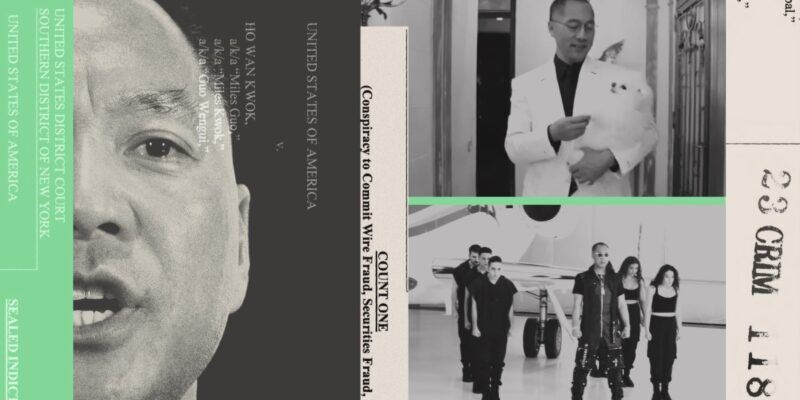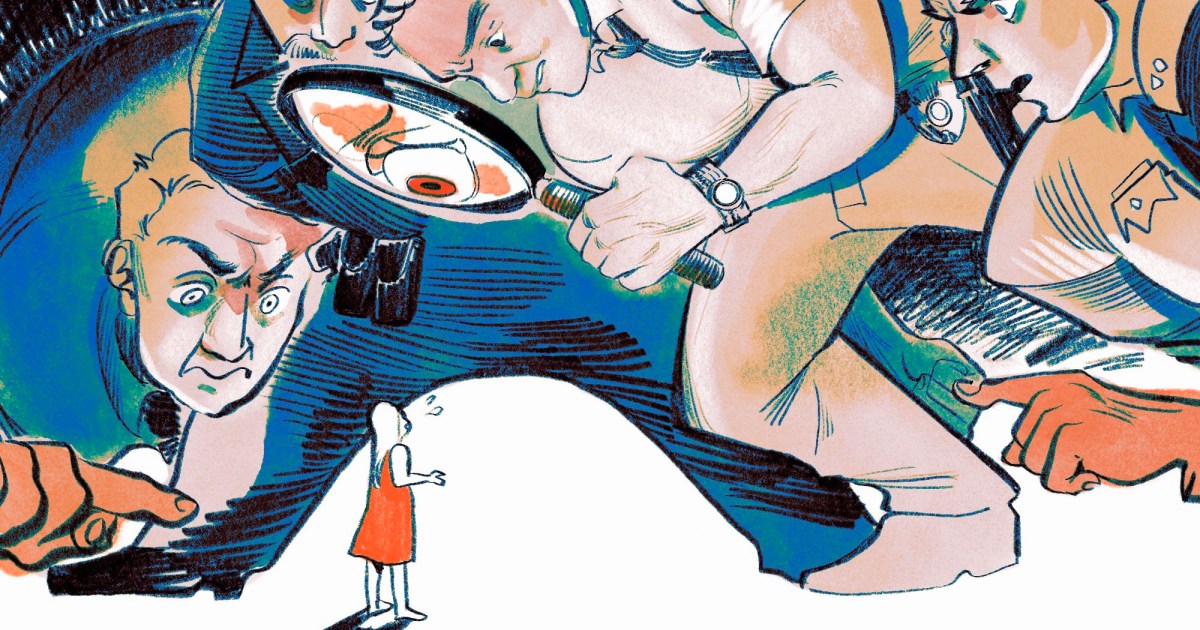
The saga of Guo Wengui—the Chinese mogul-turned-MAGA-influencer who is on trial in Manhattan federal court—involves an international political movement with the audacious goal of overthrowing China’s government. It includes former top advisers to Donald Trump. There is talk of intelligence operations, an FBI counterintelligence probe, and allegations that Guo may actually be a Chinese double agent, which he denies. Guo has underwritten crackpot claims that Covid is a Chinese bioweapon, spread smut from Hunter Biden’s laptop, and secretly steered funds to help Trump try to steal the 2020 election.
But the criminal case against Guo is simpler. Behind the spy games and Trump ties, it’s about fraud. Guo is accused of stealing hundreds of millions of dollars from thousands of his own political followers through simple investment scams.
“Miles Guo stole my money.”
The alleged victims of this scheme are Chinese-speaking emigres who were drawn to Guo beginning in 2017 due to his claim to be a leading critic of the Chinese Communist Party. These supporters joined online clubs that were part of what Guo called his “Whistleblower Movement.” In 2020, many began pouring money into “investment opportunities” he offered. Guo allegedly diverted those funds to pay for the lifestyle of a supposed billionaire, buying a mansion, a $4.4 million car, $978,000 in rugs, a yacht, and $36,000 mattresses he slept on while his fans lost their shirts.
“Miles Guo stole my money,” Jenny Li, a Nevada resident who emigrated from China about 20 years ago, testified through an interpreter Tuesday, referring to one of the various names Guo uses. “I was cheated,” she said later.
Li said she first learned of Guo after Voice of America cut off a live interview he did with that news outlet in April 2017, allegedly in response to Chinese government complaints about claims Guo made during the broadcast about CCP corruption. When Guo and former Trump aide Steve Bannon announced the launch of a nonprofit that would supposedly advance the rule of law in China—with $100 million Guo pledged to donate himself, but never did—Li contributed around $6,000, she said.
Like many Guo fans, she made a habit of watching almost all of the hours-long videos that Guo posted online most days.
In April 2020, Guo told his fans he was giving them the chance to invest in a video streaming and news company called GTV. He said the company would develop technology to evade Beijing’s censors, giving an outside perspective to millions of Chinese viewers. He also claimed that investors were guaranteed not to loss money. These, prosecutors say, were lies. But many Guo fans believed him.
Li testified that she invested more than $100,000 through various mechanisms Guo created to allow his backers to supposedly buy into GTV. She said that she raised the money by getting a second mortgage.
Most of those funds disappeared. Li eventually recovered around $18,500, via a program the SEC set up to compensate Guo’s victims. The rest was gone. “I didn’t get anything back,” Li said.
Le Zhou, a Florida realtor who first came to the United States in 1998 for college, also learned of Guo in 2017, when he began watching Guo’s YouTube videos. Zhou testified on May 28 that he backed Guo’s movement due to his own family’s suffering in China. He, too, gave first to Guo’s nonprofit, the Rule of Law Foundation.
Zhou eventually put around $120,000 of his personal funds into Guo’s investment offerings. He testified that he sold his home and tapped his wife’s life insurance to raise that money.
Zhou said he believed Guo’s supposed “personal guarantee” to GTV investors that he would repay them to cover any losses. Zhou said that he also accepted Guo’s claim that GTV investments would be used to improve GTV’s technology to help it compete with companies like YouTube, and that he bought into GTV’s supposed political purpose.
“GTV website also is for the freedom of voice for other Chinese people,” Zhou said. “I was follower myself. I [was] really a believer for this movement. I want to just be part of it and also to help grow this GTV.”
But Zhou said never received GTV stock. And when he sought to recover his funds, Guo did not step in. The SEC did, helping Zhou to recoup some of his funds. He ultimately lost $30,000, he said.
In addition, without telling GTV investors, Guo gave $100 million of the capital he raised to a hedge fund that was making what proved to be a failed bet shorting Hong Kong’s currency. Guo lost $30 million in GTV funds through the move.
Zhou said he would not have invested had he known the money would be used in a risky investment scheme rather than to grow GTV’s business.
Another alleged victim, Patrick Chin, a Texas-based engineer who grew up in Taiwan, testified last week that would not have invested about $20,000 in GTV had he known Guo’s guarantee against losses was false, or that Guo would use investor money to speculate on currency.
“I was pretty simple mind[ed] that this money will be used to build the platform, not reinvest,” Chin said.
Li, Zhou, and Chin—testifying in a courtroom packed with dozens of Guo’s remaining backers—each described a harsh reaction by Guo to followers who questioned Guo and his underlings about what happened to their money.
Zhou said he was effectively thrown out of the movement after he sought a refund on a portion of his investments. In a social media post entered into evidence, other Guo fans announced that Zhou was blacklisted for a “malicious attack” on Guo’s movement and financial ventures. At the time, Zhou had issued zero criticism of Guo, he said, apart from seeking a refund.
Li described a 2021 conference call in which Guo berated a man who asked for his GTV investment back. Guo labeled the man a CCP agent and had him booted off the call, she recalled. Li, who cried while describing this meeting, said she too, wanted to ask for her money back, but “did not dare” after seeing Guo’s reaction.
In her testimony, Li likened Guo’s movement to “a multi-level marketing scheme” run by “organized mafia.”
Chin said that his skepticism about the movement grew as he watched Guo repeatedly smear critics as Chinese agents.
“In the beginning, there were few people who left, and they were very quickly labeled as traitor or CCP spies,” Chin said. “At the time it’s very shocking, but it seems believable. But as more and more people left and more and more people were labeled as CCP, CCP spies, that became not very reasonable.”
“My feeling right now is, it’s like other cults,” Chin said. “You believe the leader and you cannot ask questions, but then some people who, quote-unquote, ‘wake up’ were able to have that effect on me.”
Guo did not use email or communicate one-on-one with his followers, despite issuing directives in videos, over WhatsApp, and in large meetings. His lawyers have used that fact to suggest that Guo’s underlings may have defrauded his followers without his involvement.
But victims who testified insisted it was Guo who conned them.
“I feel all the good intention, not [just] myself, many people were abused,” Chin said. “We tried to support a pro-democracy movement or transparency of information to Chinese people, but we were scammed.”















